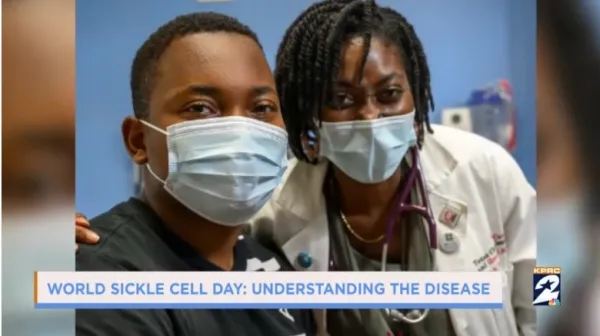
Sickle Cell and Thalassemia Program


The Sickle Cell and Thalassemia Program at Texas Children’s Cancer and Hematology Center offers comprehensive family-centered care for children with these complex blood disorders.
Our individualized course of treatment includes patient care, education, psychosocial support services, screening and counseling for children and their families. Serving over 1,300 children, our program is one of the largest in Texas. The Sickle Cell and Thalassemia Program offers the latest disease modifying therapies (e.g., hydroxyurea), transfusions and stem cell transplantation. The program participates in investigator-initiated and industry-sponsored clinical trials to help make new therapies available to patients.
Texas Children's Cancer and Hematology Center has been serving children with blood disorders since 1958. The service first employed a comprehensive program for screening newborns at the large Harris County Hospital District facility in 1975 and was instrumental in the creation of the State newborn screening program.
Multidisciplinary Care
Our multidisciplinary team is made up of board-certified pediatric hematologists, hematology-trained nurse practitioners and physician assistants, research staff and social workers.
In addition, we offer psychological support and counseling services to help families cope with difficult social, emotional and financial issues brought on by the disease’s medical complications, especially debilitating pain crises.
The Texas Children’s Sickle Cell and Thalassemia Program offers excellent ambulatory services, including outpatient blood transfusion and pain treatment programs, a sickle cell pulmonary clinic, a sickle cell stroke clinic, a sickle cell gynecology clinic, and genetic counseling—all in one location.
In addition, our program offers comprehensive services for thalassemia, including endocrinology and imaging for management of iron overload.
When it’s time, we continue to provide support to ensure a smooth transition to adult care.
About Our Sickle Cell and Thalassemia Program
What is sickle cell disease?
Sickle cell disease is an inherited red blood cell disorder. Red blood cells carry oxygen through the body. Normally, red blood cells are disc-shaped and move easily through the blood vessels. In sickle cell disease, red blood cells become crescent- or “sickle”-shaped and do not bend or move easily through blood vessels. This causes blocked blood flow to organs in the body and can lead to recurrent episodes of severe pain and other serious problems, including stroke, kidney disease, and infections.
- Of all the babies born with sickle cell disease in Texas each year, 40% live in the Greater Houston area.
- Texas Children’s Sickle Cell Program is the largest program in the Southwestern United States, caring for over 1,200 children annually.
- We provide a comprehensive model of care by incorporating doctors from many specialties (e.g. Hematology, Pulmonology), and supportive care specialists such as Nurse Coordinators, Social Workers, and Psychologists.
- We offer all recommended screening tests and treatments, as well as access to clinical trials for new treatments and curative therapies.
Our team is led by nationally and internationally recognized experts in clinical care, research and advocacy for children with sickle cell disease.
- Our center is leading efforts to ensure equitable care through innovative quality improvement efforts.
- Our sickle cell researchers have successfully competed for research funding from the National Institutes of Health (NIH) and regularly publish scholarly work
- Our center is a leader in advocating for policy to improve the care for individuals with sickle cell disease. This includes engaging with providers and policymakers at a local, state-wide, and national level.
- Our center is a leader in efforts to make all therapies, including transformative therapies, available to all individuals with sickle cell disease.
Globally, our team partners with local health care providers to improve the diagnosis and access to care for children with sickle cell disease in countries throughout sub-Saharan Africa.
- Our global team established local training programs to ensure that frontline nurses, physicians, and other local providers have access to current standard care practices and access to international experts in the field.
- Our team partners with local institutions to increase access to testing and treatments necessary to improve outcomes for children with sickle cell disease.
Related Departments
Explore more



Once ashamed of her diagnosis, doctor is now changing the narrative around sickle cell disease
today.com
World Sickle Cell Day Celebration Highlights Community and Global Initiatives


Bristol Myers Squibb Foundation, Texas Children’s Global HOPE, & Baylor College of Medicine Glo...



